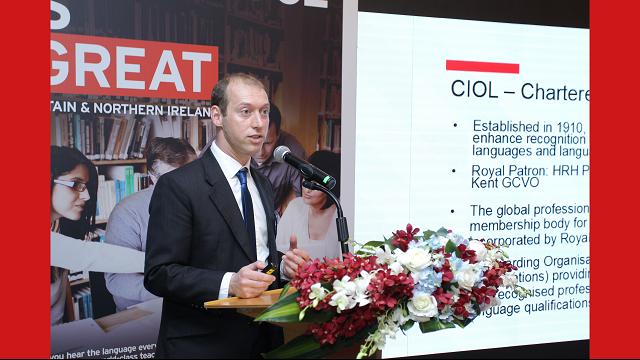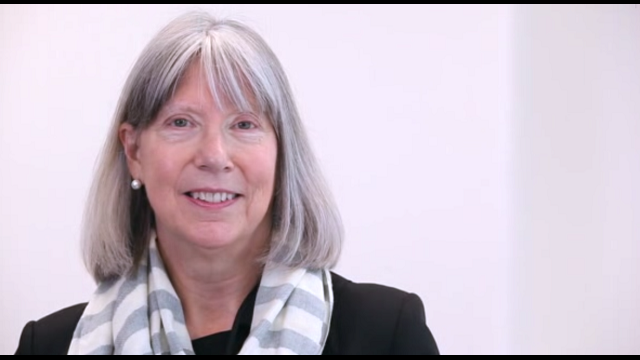-
QUALIFICATIONS
- For Linguists Worldwide
- For UK Public Services
- Preparation
- Policies & Regulation
-
MEMBERSHIP
- Join CIOL
- Professional Membership
- Affiliate Membership
- Chartered Linguist
- Already a member?
- Professional conduct
- Business & Corporate Partners
-
LANGUAGE ASSESSMENTS
- English
- All Other Languages
-
CPD & EVENTS
- Webinars & Events
- CIOL Conferences
- Networks
- CIOL Mentoring
-
NEWS & VOICES
- News & Voices
- CIOL eNews
- CIOL Awards
- The Linguist Magazine
- Jobs & Ads
-
RESOURCES
- For Translators & Interpreters
- For Universities & Students
- Standards & Norms
- CIOL & AI
- All Party Parliamentary Group
- In the UK
- UK Public Services
- Find-a-Linguist
Doing our bit for The Cause

By Emily Boaler
A monolingual mindset
Promoting languages in UK society where the native language spoken is the world’s lingua franca has never been easy…
One might ask: ‘What is The Cause?’ I didn't know myself until one of my University lecturers said to me: ‘Emily, it's great what you're doing for The Cause’. Despite me not coming across the term before, I knew exactly what he was referring to.
In this case it was writing articles about languages and mentoring students studying languages about the range of career paths they could follow with languages and how to brand themselves as ‘linguists’.
These small individual contributions help to protect and promote the use of language skills in the UK. It helps to keep those who studied languages working ‘in languages’ and encourages younger generations to give languages a go.
Why do we need The Cause?
The Cause describes a mindset of the protection and promotion of language learning in a society where the uptake of languages has been in constant decline and where the general view on languages is undervalued.
It’s often about standing up, speaking out and sometimes proving others wrong, in a society that doesn’t always see the value in languages, in a society where university language departments are closing left, right and centre and where too many people in positions of authority still say and think that everybody speaks English.
And we know it’s an uphill struggle. Students of languages now have fewer opportunities to ‘live languages’ and study abroad following the UK’s departure from the EU and exit from the wonderful ERASMUS program, which was such a huge pull-factor when encouraging students to take up languages.

Hope springs eternal
All is not lost. I scroll down my LinkedIn feed these days and see linguists promoting languages in so many wonderful ways:
- one contact promoting language learning via a multilingual football app,
- one who has created a multilingual board game,
- another offering language immersion trips,
- and another offering real-life multilingual restaurant experiences for school children.
I’m astonished by the great lengths linguists are going to when it comes to promoting and protecting language learning.
But is this enough? I’d probably say the answer is 'No'. We need more support from schools, universities, employers, recruiters, and local and national governments to support The Cause as a collective endeavour.
The four Ps
So, I’ve come up with 4 P’s to bring some passion back for language learning in the UK. These are: Perception, Protection, Purpose and Promotion.
Perception is the most important to tackle as languages are often misinterpreted. Common misperceptions are everywhere: from one believing that Brazil’s native language is Spanish not Portuguese, believing that ‘Everybody speaks English’ or believing that it’s an impossible dream to become a teacher or translator when starting to study a language. These misperceptions don’t only deter people from studying languages but undermine their value in the working world – you only have to look at the worryingly low salaries offered for multilingual jobs.
This impoverished mindset needs to be tackled head-on through collective efforts from linguists and other interested parties by talking about languages, experiences of living abroad and delivering the facts on how linguists benefit companies. Not much can be achieved until these common misperceptions are proven incorrect, and shifting this monolingual mindset is a task for us all.
Protection means keeping university language departments open, providing more placements abroad (post-Brexit), offering more language options and maintaining exposure and engagement with languages. For example, we could be offering more subject combinations, such as languages and sports management, offering more cross-curricular classes such as geography or history lessons with exposure to Spanish, Arabic or Mandarin demonstrating to native English speakers that some awareness of other languages is important to understanding the world. Promoting languages in different ways can help make languages become a valued skill again.
Purpose is all about the Why? Students won’t study languages if they can’t see the point. The purpose is above all communication – to communicate with speakers of different languages and cultures – which allows a young person to see the world through a different lens, builds intercultural relations and also provides wider job prospects. These are benefits that need to be clearly outlined not just by linguists, but by educational institutions, recruiters and employers – and government too. If students can’t see a benefit, they won’t consider languages a viable study option, which we see in the falling uptake in schools and that leads to schools giving up on languages. It’s a vicious circle that needs to be broken.
Promotion can be delivered through a plethora of methods, whether that’s running multilingual themed events, integrating language learning into the curriculum with fun activities or highlighting the practical benefits of languages in real-world careers and experiences. The key is to maintain the fun element when learning languages and to clarify the benefits of using language skills in real-life situations – including how one can make a living from language skills.
Sharing our personal stories as linguists, and the joy of studying languages and living abroad, is a personal contribution we can all make a way to promoting languages by spreading awareness of our own lives with languages.
We are winning and losing at the same time!
Who is letting the side down? It’s clear to see that many linguists are doing their utmost to promote and protect the value of learning languages. But can others do more? Recruiters? Employers? Educational Institutions? The Government? You have to say yes, they can – and they should.
I think all linguists would like to see the government invest more in languages and make them obligatory again in schools, but international employers could also do more, offering work ‘taster days’ so students can see how languages are actually used in the workplace. And fair pay matters too – whether you are language teacher, a translator, public service interpreter or a business linguist, languages are a skill which deserves fair remuneration. Perhaps we need a fifth ‘P’ of pay.
The UK as a bridge between cultures
If we could combine the value of the English we all speak, with the value of other world languages, the UK has the potential to become a multilingual powerhouse. We already have amazing linguistic diversity in this country, we work in similar time zones to Europe and Africa, and we are well within reach of South America and the Middle East so we can connect so many actual and potential clients and partners during our normal working day.
Conclusion
If we could embrace our multilingualism instead of hiding behind English, imagine how much more could we achieve? A combined effort from all parties is key to promoting and protecting language learning and persuading the next generation of linguists that languages have a purpose in their lives. We need a new message, loud and clear, which will encourage young people to take up languages again instead of turning their back on them.
We know the endless possibilities that languages can bring about, whether that’s developing personal skills, being able to connect and communicate or using them in the workplace. But first we need to persuade ourselves again that languages matter.

Emily Boaler is a Multilingual Technical Support Engineer at Oracle who graduated with a BA Hons in French, Spanish and Italian from Nottingham Trent University.
Views expressed on CIOL Voices are those of the writer and may not represent those of the wider membership or CIOL.
More
The Chartered Institute of Linguists (CIOL), Incorporated by Royal Charter, Registered in England and Wales Number RC 000808 and the IoL Educational Trust (IoLET), trading as CIOL Qualifications, Company limited by Guarantee, Registered in England and Wales Number 04297497 and Registered Charity Number 1090263. CIOL is a not-for-profit organisation.






